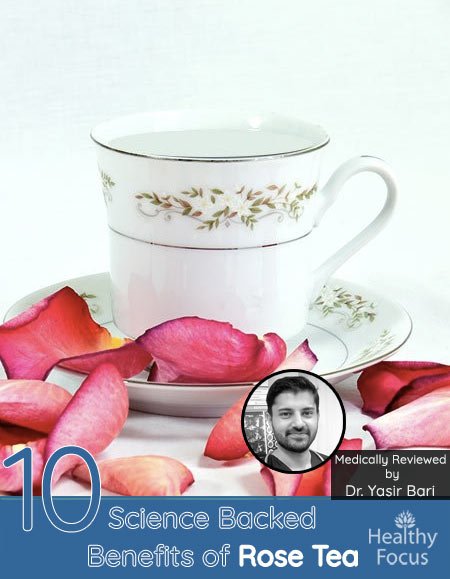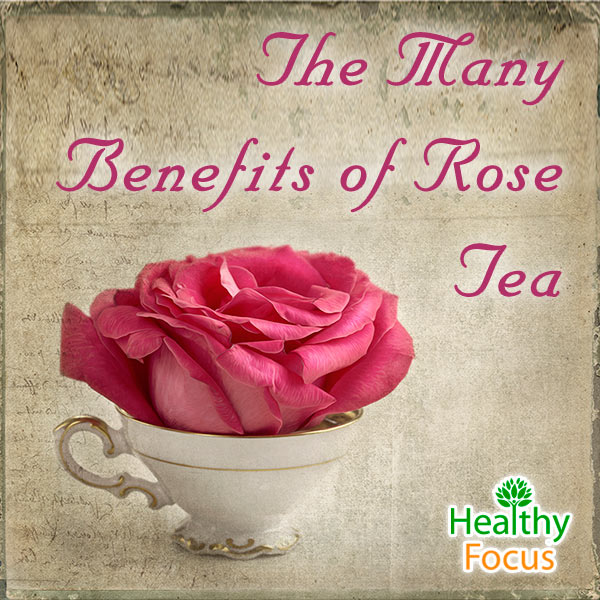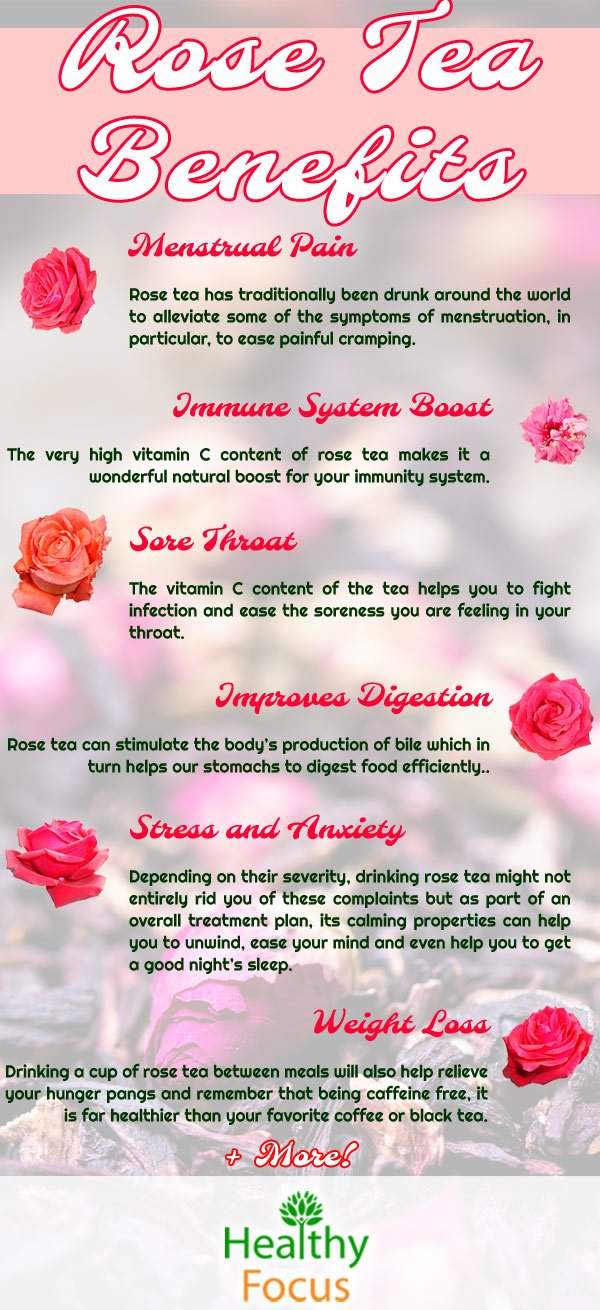Last Updated on August 31, 2023 by Marc Seward
Medically Reviewed by Dr. Yasir Bari
Bsc, (Med) Bsc, (Nutrition), MBBS, DCN (Diploma in Clinical Neurology) – Reviewed & Approved on October 26, 2018
-Written by Marc Seward
I am a massive lover of teas and have tried out more than I can count. I will admit that I used to be a coffee drinker and even the idea of regular black tea never really appealed to me. That was until I moved to Thailand some 15 years ago.
Tea is trendy here and is also cheap and readily available. I started to experiment with teas made from the flower in my garden including jasmine tea and hibiscus.
These days, I cannot get enough of the stuff, and rose tea is among my absolute favorites. I would happily drink it even if it did not bestow so many health benefits but the fact that it does is a massive bonus.
If you are interested in finding out more about this delicious, healthy tea and what exactly it can do for your health, please read on.
I am sure that you will be surprised and impressed by some of the benefits of Rose Tea and hopefully, you may be persuaded to try some for yourself.
What is Rose Tea?
Otherwise known as rosebud tea, rose tea is a very healthy and delicious beverage made from either dehydrated or fresh rose petals.
The healing powers of rose petals have been known for centuries, and today they are used to make therapeutic essential oils as well as being enjoyed as a nutritious tea.
There is plenty of evidence that the rose family of flowers is ancient with rose fossils of around 30 million years of age discovered across America.
Although its water was originally used in the Middle East, it is now cultivated worldwide.
There is evidence that roses were used in ancient medicine to heal a vast array of sicknesses. These medicinal uses include treating chest and abdominal pains, menstrual bleeding, and digestive issues.
Roses were also used to reduce inflammation in various parts of the body and to ease coughing.
There is also evidence that oil extracted from roses was used as a mild laxative and to treat emotional symptoms like depression, grief, and anxiety.
Rose tea is fragrant, fruity and packed with vitamin C and antioxidants making it the ideal drink when your body needs a boost.
Rose tea can benefit your body in any number of ways; it is excellent for the skin, can help you relax and be free of calories can even contribute towards your weight loss plan.
Rose Tea Facts
- Rosebud tea and rose tea made from the petals have been used in Chinese medicine for over 5,000 years.
- Rose tea has several beneficial effects including boosting the immune system, treating a sore throat and boosting your digestive health.
- Drinking rose tea is excellent for the skin and the hair.
- It is an excellent, natural diuretic and is used to treat urinary tract infections.
- It is a healthy, caffeine-free alternative to black tea or coffee.
- Rose tea is sometimes referred to as the ‘lady’s tea’ because of its beneficial effects during a woman’s menstrual cycle.
- Rose tea contains high levels of antioxidants and vitamin C.
- It may even help you to lose some weight.
Why Rose Tea is Good For You
Rose tea is so good for you because of the diverse range of compounds present in rose petals and the rose plant. The plant contains various flavonoids, glycosides, terpenes, anthocyanins, and carotenoids. The petals also contain various powerful antioxidant compounds including quercetin, kaempferol. The bulk of its flavonoids are present in rose essential oil.
Studies have demonstrated that the total phenoilic compound content of rose tea is even higher than green tea which is well-known for its health benefits. A compound called gallic acid has been found in certain rose cultivars and is believed to be responsible for the plant’s excellent antioxidant benefits. (6)
As well as its incredible antioxidant benefits, studies have found that rose tea also has antibacterial, anti-inflammatory, anti-fungal and anti-cancer properties .
To learn more about the specific benefits of this delicious, healthy herbal tea, please read on.
Rose Tea Benefits
As well as its high vitamin C content, rose tea contains a significant amount of polyphenols along with several other antioxidants like quercetin and ellagic acid.
Polyphenols are natural antioxidants which are well known for their ability to repair cellular damage and protect the body against serious illnesses including heart disease, bone weakness, and cancer.
For Menstrual Pain
Rose tea has traditionally been drunk around the world to alleviate some of the symptoms of menstruation, in particular, to ease painful cramping. Until relatively recently, there was no scientific evidence to support these claims, but in 2005 a study conducted in Taiwan was able to confirm its effectiveness.
In adolescence, the painful symptoms of menstruation are also linked with significantly poorer academic and sporting performance, and the aim of the study was to examine the effects of rose tea on both pain and the knock on psychological effects of menstruation.
The study which was conducted over 6 months on 130 adolescent females with dysmenorrhea concluded that rose tea resulted in less menstrual pain and also less anxiety and distress.
Researchers suggested that drinking rose tea was a simple, safe and effective treatment for the symptoms of menstruation.
“Our findings suggest that drinking rose tea is a safe, readily available, and simple treatment for dysmenorrhea, which female adolescents may take to suit their individual needs.” (1)
Skin, Acne and Hair Benefits
Rose petals are packed full of Vitamin C; indeed there are plenty of claims that one cup has the equivalent vitamin C content of 60 oranges.
I cannot verify the truth of this claim but it is certain that rose tea is a very rich source of the vitamin and that vitamin C has well understood antioxidant qualities.
It is better to get your vitamins from food where possible. Vitamins from food sources typically will be better absorbed and assimilated than via vitamins tablets or capsules.
Given our exposure to environmental free radicals and toxins, our skin needs all the help it can get.
You do not need to spend a fortune on expensive cosmetic products when you can receive all the healthful, nutritious properties that your skin needs from a more natural source.
Drinking plenty of this delicious herbal tea can help stave off the signs of aging like wrinkles and sagging.
Rose tea also supports the body’s immune system while promoting essential collagen production and we know that collagen is the protein most responsible for the health of your skin and your hair.
As well as maintaining your skin’s healthy appearance, rose petals contain anti-inflammatory and antibacterial properties that can prove effective in treating skin conditions like acne.
There is a good reason why many commercial skin care products include rose petal or rose hip extract and both rose water and rose essential oil has been used effectively to treat a variety of skin complaints.
Immune System Boost
The very high vitamin C content of rose tea makes it a wonderful natural boost for your immunity system. A strong immune system will help you to stay generally healthier and keep those annoying cases of flu and colds at arm’s length so drink up and enjoy.
For a Sore Throat
A nice hot cup of rose tea is a great home remedy for sore throats as well as the various annoying symptoms of common colds and flu such as stuffiness or a runny nose.
The vitamin C content of the tea helps you to fight infection and ease the soreness you are feeling in your throat. A teaspoon of good quality honey like manuka honey will not only add taste but improve the tea’s healing potential.
Improves Digestion
Drinking teas made from rose hip and rose petals are known to improve digestion and keep your digestive system in peak working order. Rose tea can stimulate the body’s production of bile which in turn helps our stomachs to digest food efficiently.
Bile also improves the digestion of fats in particular. Rose tea is even thought to nourish the good bacteria or microflora in the intestines. Rose tea also works as a mild laxative and is often used as an effective natural remedy for constipation.
Historically it has also used to treat diarrhea and dysentery, but there is no direct research supporting this.
The probiotic properties of rose tea could be helpful depending on the cause of the stomach issue.
For Stress and Anxiety
As well as its variety of physical health befits, rose tea can be used to calm the mind and elevate your mood. Stress, anxiety, and depression are becoming ever more prevalent conditions in today’s modern world.
Those who suffer from these debilitating illnesses are increasingly on the lookout for a natural and safe alternative to the commonly prescribed pharmaceutical medications which are known to come bundled with risks of addiction and nasty side effects.
Depending on their severity, drinking rose tea might not entirely rid you of these complaints but as part of an overall treatment plan, its calming properties can help you to unwind, ease your mind and even help you to get a good night’s sleep.
Urinary Tract Infections (UTIs)
If you are suffering from a painful infection of the urinary tract, drinking rose tea can help you to bring the infection under control and ease your painful symptoms. Rose tea is a natural diuretic which means that it promotes both the quantity and frequency of urination.
This coupled with its antioxidant and antibacterial properties make it an effective natural treatment for mild infections of the urinary tract.
Drinking rose tea can also help with the health of your kidney, and many proponents claim that it can even help prevent you from getting kidney stones.
Rose Tea Antimicrobial Benefits
According to studies, roses contain a number of compounds with antimicrobial properties that could benefit your health in various ways. Rose petals contain phenolic acids, tannins, flavonoids, and antioxidant carotenoids which are variously respoonsible for the plant’s antimicrobial effects.
In studies, rose petals have demonstrated inhibitory effects against various bacterial strains including E.Coli, Staphylococcus epidermidis, Proteus mirabilis, S.aureus, Micrococcus luteus, Bacillus subtilis and pseudomonas aeruginosa.
The same study found that not only are rose petals effective against bacteria but they are also effective against certain species of yeast including Candida albicans.(5)
Rose Tea Might Aid Weight Loss
Before getting your hopes up too high, I should mention that there is no miracle fat busting compounds contained in rose tea.
It is, however, a healthy calorie-free alternative to many of the sugar-laden drinks that we tend to consume in excess.
Merely drinking rose or any other healthy teas as a substitute your soda or sweet, creamy coffee will help you to control your weight in the long term.
Drinking a cup of rose tea between meals will also help relieve your hunger pangs and remember that being caffeine free, it is far healthier than your favorite coffee or black tea.
As part of your overall diet plan, you could do far worse than incorporating rose tea into your diet but the same thing goes for the majority of other herbal teas,
Might Relieve Constipation
Rose tea has been traditionally used for a very long time to treat constipation. It has gentle laxative properties and might be a good natural choice for those battling with constipation.
Despite being used traditionally to treat constipation, there is no scientific evidence to back up the claims.
It is Caffeine-free!
Since Rose Tea has no caffeine, it is safe and healthy to drink at any time of the day. If you have steady doses of coffee and black tea during the day switching to non-caffeinated tea like Rose tea at night is a good idea.
Recent Research into Rose Tea and Rosa Centifolia
There have been some studies in recent years to examine the traditional health claims and investigate new potential benefits of Rose tea and other Rose extracts.
In general, the studies support most of the claims and find even more potential benefits and uses.
Potential Anti-Mutagen and Anti-Cancer Agent
Anti-mutagenic compounds block mutagens. Mutagens increase mutations in genetic material. Some mutations can cause cancer–so blocking them can be beneficial.
A 2013 study examined petals from different Rose cultivars for anti-mutagenic properties. The found that “passion” cultivar had the most anti-mutagenic properties due to its high anthocyanin content.
The study also found that the anthocyanin content of the raw rose petal and rose petal tea remained stable. Meaning that heating via boiling water had no effect on the beneficial effects.
So this is a case where we can clearly say the tea truly has a benefit. (2)
Potential Anti-inflammatory for Arthritis
A 2015 study examined the anti-inflammatory and anti-arthritic properties of Rose Centifolia extract. The study used a liquid extract and tested inflammation in rats.
The anti-inflammatory effect of Rosewater was equivalent to the prescription NSAID Indomethacin (Indocin and Tivorbex).
The researchers concluded that Rosa Centifolia had potential as an anti-arthritic and anti-inflammatory. (3)
Potential to Treat Scalp Seborrheic Dermatitis
A 2014 Study compared a natural shampoo made with Rose petal extract and EGCG’s to ketoconazole and zinc-pyrithione shampoos. There were all tested for the treatment of Scalp Seborrheic Dermatitis.
The Rose petal extract shampoo was found to be equivalent to both of the medicated treatments. (4) A homemade equivalent might be Rose tea and Green tea shampoo (for EGCGs).
How to Make Rose tea
So now that you know how much goodness this tea has to offer, why wait? Making a delicious cup of rose tea is quick and very easy.
Before you go any further, however, it is important that you only use rose petals that have not been treated with pesticides.
Organic is definitely worth it as conventional Roses are often treated with pesticides that can be difficult to remove.
Since you are dealing with a dried product it is not like produce which you can wash—so definitely make sure you get Organic Rose tea.
Dried rose petals are not difficult to find these days but if you want to pick and make your own, follow these simple steps.
- You will need a cup of rose petals. Clean them well and make sure you discard the white colored base.
- Wash the petals again in clean water and dry them by patting with a clean towel.
- Bring a cup and a half of water to a near boil in a saucepan. The ideal temperature is 80 degrees Celsius/176 Fahrenheit. If you have an electric kettle you can probably set it to “Herbal” or “Green tea”.
- Add your rose petals to the near boiling water then after a few seconds turn down the heat and allow it to simmer for between 5 and 10 minutes by which point the petals should have turned dark.
- Strain out the petals and fill a cup with your finished tea.
- You can add spices or honey to taste although it tastes delicious without any additions.
Rose Tea Side Effects
Rose tea is considered to be a safe drink and no adverse side effects have been reported. Despite its safety, some experts warn that you should limit the amount you drink to a maximum of 5 cups per day because consuming too much vitamin C can have certain adverse effects—like diarrhea. Drinking too much rose tea could potentially cause dizziness, nausea, vomiting, diarrhea or headaches.
Rose Tea and Pregnancy
Rose tea is likely safe to drink during pregnancy and when breast feeding. However you should speak to your doctor if you have any doubts at all.
Rose Tea Pros and Cons
- Rose tea is a delicious caffeine-free beverage that you can drink instead of your regular caffeinated drinks.
- It has a number of excellent health effects and is known to boost the improve the immune system and treat respiratory health.
- It is full of antioxidant polyphenols that help protect the heart and studies show they may even help protect against cancer.
- It is especially helpful for women’s health. Studies have demonstrated that rose tea can alleviate many of the symptoms of menstruation.
- It has excellent diuretic effects that can help treat urinary tract infections and flush the system.
- It may help you shed some unwanted weight in the long-term.
- It is very easy to make with either fresh or dried rose petals.
Cons
- Drinking more than three cups a day may cause certain side effects including nausea, vomiting, fatigue, and headaches.
- Drinking too much before bedtime may cause sleeping issues and could affect the quality of your sleep.
- It can hinder blood clotting and is not suitable for people with a bleeding disorder.
Frequently Asked Questions
What is Rose Bud tea good for?
Rose tea has a number of excellent health benefits. It is an extremely good source of antioxidants which can help ward off illness and keep you looking young. It is also a great source of vitamin C and can help bolster the immune system. Rose tea is also anti-inflammatory, can help improve digestive health and is commonly used by women to treat menstrual symptoms.
Is Rose tea good for weight loss?
There is no evidence that drinking rose tea will lead to a large amount of weight loss. However, if you replace your usual calorie-filled drinks with low-calorie herbal beverages like rose tea, it is almost bound to have an effect in the long run especially as part of an overall diet plan.
Can I drink rose tea everyday?
Drinking rose tea is not associated with any serious side effects. Drinking two or three cups each day should be safe for the vast majority of people. If in doubt, speak to your doctor.
Is Rose tea a laxative?
Rose tea is sometimes used as a natural laxative. It may have very mild laxative properties and is sometimes used as a natural remedy for constipation. It has been used traditionally to boost digestive health and even to treat diarrhea but there is no evidence to support its use for these conditions.
Final Thoughts
Rose tea is a very healthy and nutritious beverage that makes for a great alternative to your regular caffeinated drinks. Rose petals are very high in Vitamin C as well as various powerful antioxidants.
Drinking rose tea can boost digestive health, help women overcome menstrual pain, boost the immune system and may even help you lose weight as part of an overall diet plan. It may also help relieve stress and anxiety and help you get a good night of sleep.
Rose tea is considered to be safe to drink for the majority of people and very few adverse side effects have ever been reported.
Give it a go and let us know what you think.
(1) http://www.ncbi.nlm.nih.gov/pubmed/16154059
(2) http://www.ncbi.nlm.nih.gov/pubmed/23627876
(3) http://www.ncbi.nlm.nih.gov/pubmed/26222375
(4) http://www.ncbi.nlm.nih.gov/pubmed/25473226
(5) https://www.ncbi.nlm.nih.gov/pubmed/23818393
(6) https://www.academia.edu/16601220/Rose_Petal_Tea_as_an_Antioxidant-rich_Beverage_Cultivar_Effects




Leave a Reply
You must be logged in to post a comment.